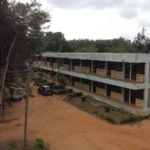
Ohawu Agricultural College in the Volta Region is grappling with severe infrastructure and staffing deficits even as expectations rise over its promised conversion into a fully-fledged university.
The college, Ghana’s only agricultural training institution in the region, currently serves about 400 students with just 18 teaching staff. Lecture halls, hostels, and staff accommodation remain grossly inadequate, while most campus buildings date back to the Nkrumah era. Compounding the challenges, the institution still lacks access to potable water and relies on a single bus for student fieldwork and internships.
Calls for urgent intervention have intensified following President John Dramani Mahama’s pledge to elevate the college to university status. Stakeholders argue that the transformation would not only address educational needs but also provide a major boost to agricultural development in southeastern Ghana, where no university currently exists.
Local traditional authorities, led by Torgbui Kordor III, have echoed the need for broader investment in both the college and the surrounding community. The recent decision by the Anlo Hogbetsotso Za planning committee to host the festival launch at Ohawu has further spotlighted the college’s role as a potential catalyst for regional development.
Despite limited resources, the college has made efforts to modernise its programmes, phasing out certificate courses in favour of diploma and Higher National Diploma offerings. New courses in animal health and production were introduced last year, while partnerships with the Canadian IDRC and the World Food Programme have supported curriculum review and training equipment supply.
Students, however, continue to struggle with financial pressures, citing the withdrawal of allowances as a major obstacle. Many argue that sustained government support is critical to enable them to pursue their studies effectively.
For Principal Ernest Mawufemor Kwesi Abiwu and his staff, the vision of a university upgrade remains alive but requires a holistic approach—one that addresses not only academic programmes but also infrastructure, internet access, transport, and housing.
The future of Ohawu Agricultural College is closely tied to Ghana’s broader agricultural ambitions. With agriculture as the lifeblood of the Volta Region, a fully developed university could become a driver of modernisation, investment, and skilled workforce development. Until then, the college continues to balance promise and reality, hoping that long-awaited transformation will finally materialise.
The Multimedia Group is the media partner of the 2025 Anlo Hogbetsotso Za.